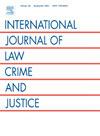The path from childhood to crime: Adverse childhood experiences, personality, substance abuse, and criminal decision-making
IF 1.4
4区 社会学
Q3 CRIMINOLOGY & PENOLOGY
International Journal of Law Crime and Justice
Pub Date : 2025-09-08
DOI:10.1016/j.ijlcj.2025.100775
引用次数: 0
Abstract
Research in criminal decision-making has greatly expanded beyond the focus on rational (cognitive) choices in several ways. For example, scholars have begun to explore how Adverse Childhood Experiences (ACEs), affective states, maladaptive personality traits, and substance abuse contribute to offending decisions. However, little research has empirically tested the wholistic path from ACEs, personality traits, substance abuse, affect, cognition, and criminal offending. As such, this project explores the indirect path from ACEs to criminal offending via Dark Triad personality traits, substance abuse, and cognitive and affective states. Findings indicate that ACEs are strong positive predictors of both substance abuse and personality traits. In addition, these traits are also positively related to future offending. The results also show that both cognitive and affective states are important predictors of decisions. Specifically, greater perceived certainty, and confidence in this perception, are related to increased fear of apprehension (affect), which nonlinearly predicts future offending.
从童年到犯罪的道路:不良的童年经历、个性、药物滥用和犯罪决策
对犯罪决策的研究已经大大超出了对理性(认知)选择的关注。例如,学者们已经开始探索不良的童年经历(ace)、情感状态、适应不良的人格特征和药物滥用是如何影响犯罪决定的。然而,很少有研究从经验上测试了ace、人格特征、药物滥用、情感、认知和犯罪行为的整体路径。因此,这个项目通过黑暗三合一人格特征、药物滥用以及认知和情感状态来探索从ace到犯罪的间接途径。研究结果表明,ace是药物滥用和人格特征的强烈积极预测因子。此外,这些特征也与未来的犯罪行为呈正相关。结果还表明,认知和情感状态都是决策的重要预测因素。具体来说,更大的感知确定性和对这种感知的信心,与对恐惧(影响)的恐惧增加有关,这非线性地预测了未来的犯罪。
本文章由计算机程序翻译,如有差异,请以英文原文为准。
求助全文
约1分钟内获得全文
求助全文
来源期刊
CiteScore
2.70
自引率
0.00%
发文量
25
审稿时长
47 days
期刊介绍:
The International Journal of Law, Crime and Justice is an international and fully peer reviewed journal which welcomes high quality, theoretically informed papers on a wide range of fields linked to criminological research and analysis. It invites submissions relating to: Studies of crime and interpretations of forms and dimensions of criminality; Analyses of criminological debates and contested theoretical frameworks of criminological analysis; Research and analysis of criminal justice and penal policy and practices; Research and analysis of policing policies and policing forms and practices. We particularly welcome submissions relating to more recent and emerging areas of criminological enquiry including cyber-enabled crime, fraud-related crime, terrorism and hate crime.

 求助内容:
求助内容: 应助结果提醒方式:
应助结果提醒方式:


